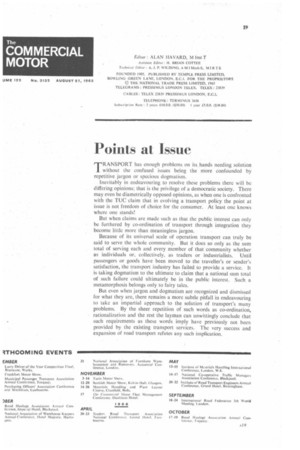Points at Issue
Page 21

If you've noticed an error in this article please click here to report it so we can fix it.
TRANSPORT has enough problems on its hands needing solution 1 without the confused issues being the more confounded by repetitive jargon or specious dogmatism.
Inevitably in endeavouring to resolve these problems there will be differing opinions; that is the privilege of a democratic society. There may even be diametrically opposed opinions, as when one is confronted with the TUC claim that in evolving a transport policy the point at issue is not freedom of choice for the consumer. At least one knows where one stands!
But when claims are made such as that the public interest can only be furthered by co-ordination of transport through integration they become little more than meaningless jargon.
Because of its universal scale of operation transport can truly be said to serve the whole community. But it does so only as the sum total of serving each and every member of that community whether as individuals or. collectively, as traders or industrialists. Until passengers or goods have been moved to the traveller's or sender's satisfaction, the transport industry has failed to provide a service. It is taking dogmatism to the ultimate to claim that a national sum total of such failure could ultimately be in the public interest. Such a metamorphosis belongs only to fairy tales.
But even when jargon and dogmatism are recognized and dismissed for what they are, there remains a more subtle pitfall in endeavouring to take an impartial approach to the solution of transport's many problems. By the sheer repetition of such words as co-ordination, rationalization and the rest the layman can unwittingly conclude that such requirements as these words imply have previously not been provided by the existing transport services. The very success and expansion of road transport refutes any such implication.












































































































